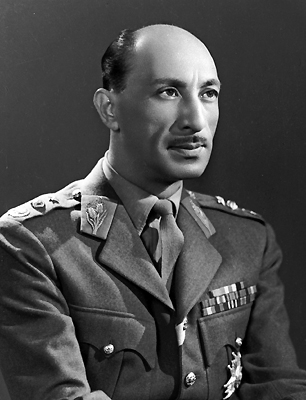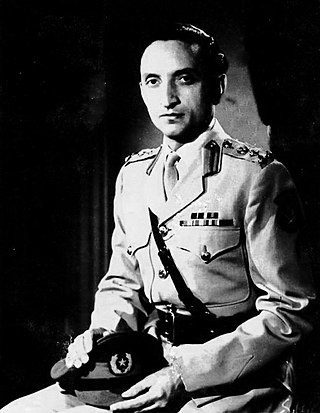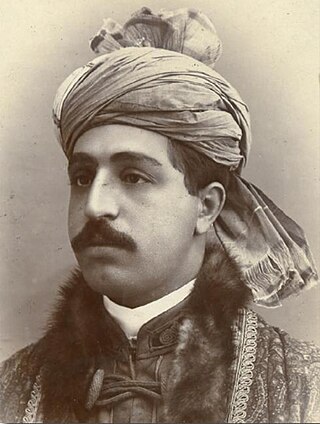| |||||
| Decades: | |||||
|---|---|---|---|---|---|
| See also: | Other events of 1879 List of years in Afghanistan | ||||
The following lists events from 1879 in Afghanistan.
| |||||
| Decades: | |||||
|---|---|---|---|---|---|
| See also: | Other events of 1879 List of years in Afghanistan | ||||
The following lists events from 1879 in Afghanistan.
February 21: Amir Sher Ali Khan dies in Mazar-i-Sharif, leaving the throne to his son, Mohammad Yaqub Khan.
May 26: Afghan and British leaders sign the Treaty of Gandamak during the Second Anglo-Afghan War. The treaty cedes parts of the Afghan frontier to Britain.
October 12: Mohammad Yaqub Khan abdicates and takes refuge in the British camp near Kabul. [1]

Abdur Rahman Khan also known by his epithets, The Iron Amir, was Amir of Afghanistan from 1880 to his death in 1901. He is known for perpetrating the Hazara Genocide, but also uniting the country after years of internal fighting and negotiation of the Durand Line Agreement with British India.

European influence in Afghanistan has been present in the country since the Victorian era, when the competing imperial powers of Britain and Russia contested for control over Afghanistan as part of the Great Game.

Mohammad Zahir Shah was the last king of Afghanistan, reigning from 8 November 1933 until he was deposed on 17 July 1973. Ruling for 40 years, Zahir Shah was the longest-serving ruler of Afghanistan since the foundation of the Durrani Empire in the 18th century.

Emir Dost Mohammad Khan Barakzai, nicknamed the Amir-i Kabir, was the founder of the Barakzai dynasty and one of the prominent rulers of Afghanistan during the First Anglo-Afghan War. With the decline of the Durrani dynasty, he became the Emir of Afghanistan in 1826. An ethnic Pashtun, he belonged to the Barakzai tribe. He was the 11th son of Payinda Khan, chief of the Barakzai Pashtuns, who was killed in 1799 by King Zaman Shah Durrani.

Sher Ali Khan was Amir of Afghanistan from 1863 to 1866 and from 1868 until his death in 1879. He was one of the sons of Dost Mohammed Khan, founder of the Barakzai dynasty in Afghanistan.

The Second Anglo-Afghan War was a military conflict fought between the British Raj and the Emirate of Afghanistan from 1878 to 1880, when the latter was ruled by Sher Ali Khan of the Barakzai dynasty, the son of former Emir Dost Mohammad Khan. The war was part of the Great Game between the British and Russian empires.

Mohammad Shah was the third Qajar shah of Iran from 1834 to 1848, inheriting the throne from his grandfather, Fath-Ali Shah. From a young age, Mohammad Mirza was under the tutelage of Haji Mirza Aqasi, a local dervish from Tabriz whose teachings influenced the young prince to become a Sufi-king later in his life. After his father Abbas Mirza died in 1833, Mohammad Mirza became the crown prince of Iran and was assigned with the governorship of Azarbaijan. After the death of Fath-Ali Shah in 1834, some of his sons including Hossein Ali Mirza and Ali Mirza Zel as-Soltan rose up as claimants to the throne. With the support of English and Russian forces, Mohammad Shah suppressed the rebellious princes and asserted his authority.

Fath-Ali Shah Qajar was the second Shah (king) of Qajar Iran. He reigned from 17 June 1797 until his death on 24 October 1834. His reign saw the irrevocable ceding of Iran's northern territories in the Caucasus, comprising what is nowadays Georgia, Dagestan, Azerbaijan, and Armenia, to the Russian Empire following the Russo-Persian Wars of 1804–1813 and 1826–1828 and the resulting treaties of Gulistan and Turkmenchay. Historian Joseph M. Upton says that he "is famous among Iranians for three things: his exceptionally long beard, his wasp-like waist, and his progeny."

Sir Pierre Louis Napoleon Cavagnari was a British soldier and military administrator.

Lieutenant General Sahabzada Mohammad Yaqub Ali KhanSPk was a Pakistani politician, diplomat, military figure, linguist, and a retired general in the Pakistani Army.

The Treaty of Gandamak officially ended the first phase of the Second Anglo-Afghan War. The Afghan emir Mohammad Yaqub Khan ceded various frontier areas as well as Afghanistan's control of its foreign affairs to the British Raj.

Mohammad Yaqub Khan was Emir of Afghanistan from February 21 to October 12, 1879. He was a Pashtun and the son of the previous ruler, Sher Ali Khan.

Ghazi Mohammad Ayub Khan also known as The Victor of Maiwand or The Afghan Prince Charlie was, for a while, the governor of Herat Province in the Emirate of Afghanistan. He was Emir of Afghanistan from 12 October, 1879 to 31 May, 1880. He also led the Afghan troops during the Second Anglo-Afghan War and defeated the British Indian Army at the Battle of Maiwand. Following his defeat at the Battle of Kandahar, Ayub Khan was deposed and exiled to British India. However, Ayub Khan fled to Persia. After negotiations in 1888 with Sir Mortimer Durand, the ambassador at Tehran, Ayub Khan became a pensioner of the British Raj and traveled to British India in 1888, where he lived until his death in 1914 in Lahore, Punjab. He was buried in Peshawar and had eleven wives, fifteen sons, and ten daughters. Two of his grandsons, Sardar Hissam Mahmud el-Effendi and Sardar Muhammad Ismail Khan, served as brigadiers in the Pakistan Army.

Mohammadzai, also spelled Moḥammadzay, is a Pashtun sub-tribe or clan of the Barakzai which is part of the Durrani confederacy of tribes. They are primarily centered on Kandahar, Kabul and Ghazni in Afghanistan as well as in the city of Charsadda in neighbouring Pakistan. The Mohammadzai ruled Afghanistan from 1823 to 1978, for a total of 155 years. Their rule ended under Daoud Khan when the Communists took power via a Soviet-backed coup.

The Emirate of Afghanistan, known as the Emirate of Kabul until 1855, was an emirate in Central Asia and South Asia that encompassed present-day Afghanistan and parts of present-day Pakistan. The emirate emerged from the Durrani Empire, when Dost Mohammad Khan, the founder of the Barakzai dynasty in Kabul, prevailed.

Kurwai State was a princely state of British India under the Bhopal Agency and centered around Kurwai town. The town of Kurwai was founded by Mohammed Diler Khan in 1715. The state was 368 km2 in area and had a population of 30,631 in 1892.

Mohammad Azam Khan was the Emir of Afghanistan from October 7, 1867, to August 21, 1868. He was born in 1820 and was the fifth son of Dost Mohammed Khan. He was an ethnic Pashtun and belonged to the Barakzai tribe. Azam Khan succeeded his brother Mohammad Afzal Khan after the latter's death on October 7, 1867. Sher Ali Khan was reinstated as Amir of Afghanistan and his forces captured Kabul on August 21, 1868. Sher Ali himself entered Kabul on September 8, 1868. Mohammad Azam Khan fled to Sistan and then to Iran, where he died in 1870.

Bārakzai is the name of a Pashtun tribe from present-day Kandahar, Afghanistan. '"Barakzai" is a common name among the Pashtuns and it means "son of Barak" in Pashto. According to the Encyclopædia Iranica, "In the detailed Pashtun genealogies there are no fewer than seven instances of the ethnic name Bārakzī, at very different levels of tribal segmentation. Six of them designate simple lineages within six different tribes located in the Solaymān mountains or adjacent lands... The seventh instance, on the other hand, designates one of the most important Pashtun tribes in numbers and historic role, part of the Zīrak branch of the Dorrānay confederation.

Bilateral relations of Afghanistan and the United Kingdom of Great Britain and Northern Ireland span a long and eventful history, dating back to the United Kingdom's Company rule in India, the British-Russian rivalry in Central Asia, and the border between modern Afghanistan and British India. There has been an Afghan embassy in London since 1922 though there was no accredited Afghan ambassador from 1981 to 2001.
The Afghan Civil War was fought from 9 June 1863 to January 1869. It began as a result of Dost Mohammad Khan's death on 9 June 1863 and the subsequent power struggles among his sons. Dost Mohammad consolidated his power in the second half of his reign within his inner family. His sons were appointed governors of provinces and effectively acted autonomous from the central government. This would inevitably lead to his sons fighting for control after his death.